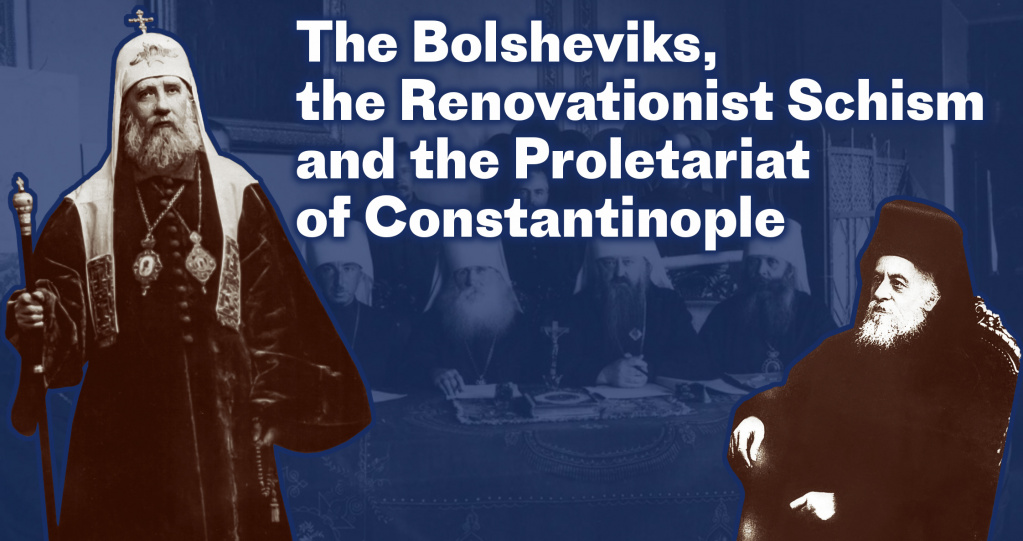The Bolsheviks, the Renovationist Schism and the Proletariat of Constantinople
Mikhail Shkarovsky, Doctor of historical science, leading researcher and head archivist of the State Central Archive of St. Petersburg, lecturer at the St. Petersburg State Institute of Culture, professor of the St. Petersburg Theological Academy, member of the scientific council of the Institute of Comparative Church-State Research in Berlin
Mutual interaction between the patriarchs of Constantinople and the Bolsheviks began several years before October 1917. This communication was mutually advantageous. If the Bolsheviks wanted to legalize the Renovationists with the help of Constantinople, then the Phanar wanted to secure itself from the pressure of the Turks who were also interested in a stable relationship with the USSR. It was into this triangle that the Russian Orthodox Church fell with Patriarch Tikhon as its head. Let us examine the basic landmarks of the Bolsheviks’ contacts with Constantinople in the first decade after the October coup.
Indirect interaction
20th November 1918
The People’s Commissariat for Foreign Affairs released from requisitioning and nationalization the representation office of the Patriarch of Constantinople in Russia (Moscow, Krapivensky Lane, 4).
2nd December 1918
The legal department of the Moscow City Council decreed that the representation office of the Patriarch of Constantinople in Russia should be exempt from the government decree on the separation of the church from the state.
As a result of this the property of Constantinople in Moscow became a permanent bone of contention between the Patriarch and the Bolsheviks.
First Court Judgment
5th May 1922
The Synod of the Patriarchate of Constantinople adopted a memorandum defending the rights of persecuted Christians in Asia and Russia, condemning the Bolshevik campaign for confiscating church valuables and the arrest of His Holiness the Patriarch of Moscow and All Russia Tikhon.
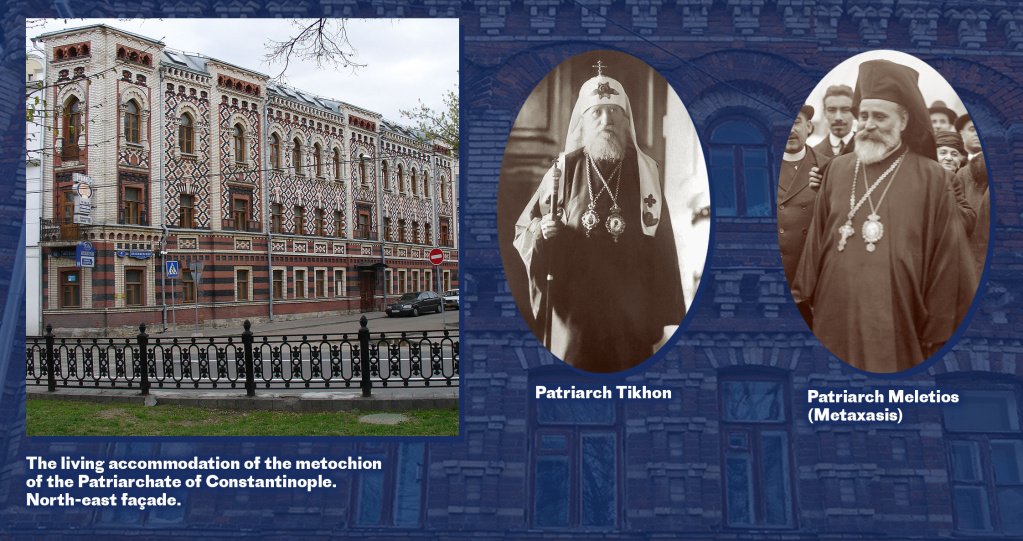
Support for the Renovationist schism
9th June 1922
The Patriarch of Constantinople Meletios IV (Metaxasis) sent to his representative in the Russian Soviet Federal Socialist Republic (RSFSR) archimandrite Jacob (Dimopoulo) a letter in which he expresses his wish under certain conditions to send a delegation of the Patriarchate to Moscow to a congress, organized in May 1922 by the Soviet authorities, of representatives of the Renovationist schism.
7th – 11th August 1922
The representative of the Patriarch of Constantinople in the RSFSR archimandrite
Jacob (Dimopoulo) took part in the congress of the ‘Living Church’ Renovationist schism as an honorary member of the presidium.
29th – 9th May 1923
The representative of the Patriarch of Constantinople in the RSFSR archimandrite Jacob (Dimopoulo) took part in the Second Renovationist Council which adopted a resolution on the defrocking of His Holiness Patriarch Tikhon of Moscow and All Russia.
Request for protection
January 1923
At the beginning of January 1923 the representative of the Patriarch Constantinople in the RSFSR archimandrite Jacob (Dimopoulo) appealed to the Renovationist Supreme Church Directorate with a request to intercede before the “esteemed Soviet authorities” to protect the rights of the Patriarchate of Constantinople before the Turkish government.
Condolences on the occasion of the death of Lenin
January 1924
At the end of January 1924 the new representative of the Patriarchate of Constantinople in the USSR hieromonk Basil (Dimopoulo) expressed condolences to the family of the deceased and the Soviet government on the occasion of the death of Lenin.
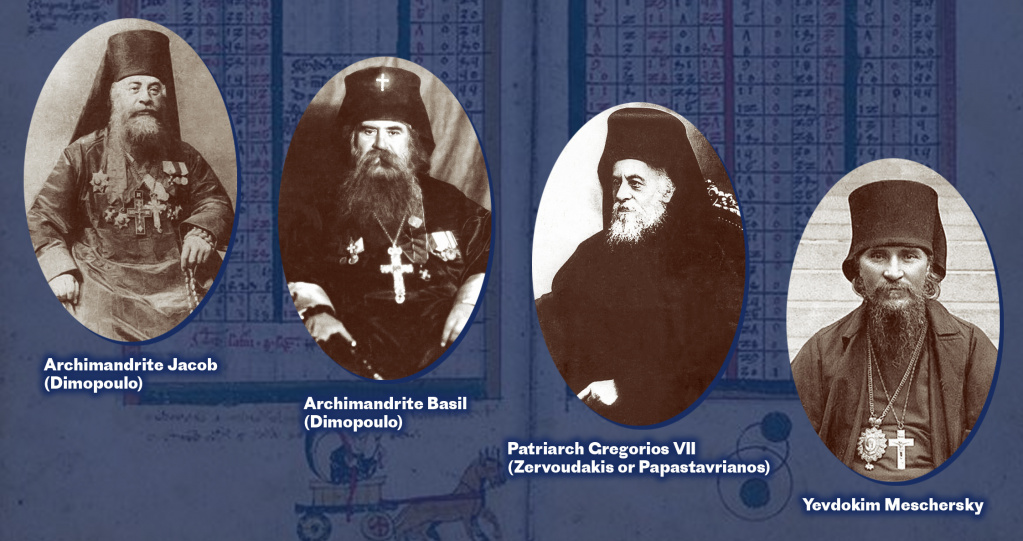
The New Julian Calendar
8th March 1924
Patriarch Gregorios VII (Zervoudakis or Papastavrianos), along with the Synod, introduces the new Julian calendar into the Church of Constantinople. In reply to the circular letter of Patriarch Gregorios VII on the introduction of the new style, His Holiness Patriarch Tikhon of Moscow and All Russia informed the Patriarch of Constantinople that, although he had received the letter on the introduction of the new style on 10th March, it was impossible in the Russian Church to introduce this style as the people would be resolutely against it.
23rd March 1924
The chairman of the Renovationist Synod ‘metropolitan’ Yevdokim Meschersky also received the circular letter of Patriarch Gregorios VII on the introduction of the new style. The Renovationists perceived this gesture of attention to be an act of recognition.
Direct support for the Renovationists and the Bolsheviks
29th March 1924
The Patriarchate of Constantinople sent to the administrator of the Russian communities in Istanbul archbishop Anastasius (Gribanovsky) a letter in which Russian clergy on the territory of the Patriarchate of Constantinople are enjoined to avoid “showing any political attributes both in promoting names and persons with political aspirations and preferences and therefore able to cause serious damage in particular and general”. In interpreting the content of this letter, the secretary of the Synod of Constantinople wrote that here “it is forbidden to touch upon Bolshevism from all angles, even that of their antireligious and moral aspect as this could cast a shadow over the Soviet authorities which have been recognized as legitimate by the Russian people and Patriarch Tikhon”. The Russian clergy were advised to “recognize the Bolsheviks”. Moreover, as the Patriarchate of Constantinople had recognized the Renovationist Synod in the USSR, the Russian clergy in Istanbul were strictly forbidden from commemorating the name of Patriarch Tikhon at divine worship and to commemorate the Synod of the Russian Church Abroad. Archbishops Anastasius (Gribanovsky) and Alexander (Nemolovsky) refused to submit to this decree.
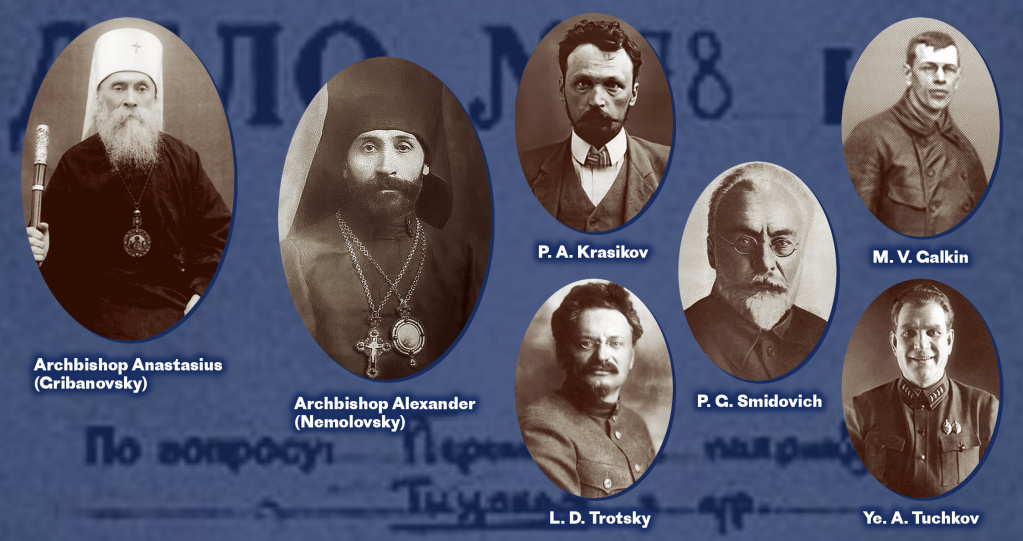
The Patriarchate of Constantinople moves to Russia
18th April 1924
The Renovationist Synod decreed:
“As a result of the exiling by the Kemalists of the Ecumenical Patriarch Gregorios VII and his serious material situation, we must show him hospitality as he has always guarded the interests of the Orthodox Church of Russia, and for this, with the consent of the five [Trotsky, Smidovich, Galkin, Krasikov and Tuchkov], allow him the right to freely choose his place of residence one of the following cities: Novorossiisk, Odessa, Kiev, Petrograd and even Moscow with complete material support for His Holiness Gregorios VII as well as his entourage upon condition of the legalization of the Synod and all the resolutions of the (Renovationist) council of 1923 which deposed Patriarch Tikhon”.
Paschal eggs from the Patriarch
Spring of 1924
The Patriarch of Constantinople Gregorios VII sent to the Renovationist Synod his greetings in the form of Paschal eggs.
Pressure on Patriarch Tikhon
6th May 1924
In his speech to the Synod of Constantinople Patriarch Gregorios VII called upon the Patriarch of Moscow and All Russia Tikhon to renounce voluntarily his Patriarchal rule and to abandon all ecclesiastical administration as soon as possible. According to the translation of archimandrite Basil (Dimopoulo) which circulated around Moscow under the title ‘The introductory speech by His Holiness the Ecumenical Patriarch Gregorios VII and the resolution of the Holy Synod on the basis of work sent to the USSR by the Patriarchal Mission’, Patriarch Gregorios VII stated that “at the invitation of church circles in the USSR” (that is, the Renovationists) he had accepted the proposed “cause of reconciliation of recent troubles and discord that had affected the brother Church there in appointing a special Patriarchal commission consisting of bishops”. The commission was to “go there in order with God’s help to enable with words of love and by means of various directions to restore accord and unity in the brother Church for the good of all Orthodoxy”. It was especially noted that the “commission in its work ought to rely upon this church movements which are loyal to the government of the USSR”.
1st June 1924
The Soviet newspaper Izvestia published an article entitled ‘The Ecumenical Patriarch removes the former Patriarch Tikhon from administering the Russian Church’ in which it was stated:
‘The Moscow representative of the Ecumenical Patriarch archimandrite Basil Dimopoulo has informed the representative of the Russian Telegraph Agency the following: “I have just received information from Constantinople that the Synod of the Patriarchate of Constantinople under the presidency of the Ecumenical Patriarch Gregorios VII has issued a decree removing from the administration of the Russian Orthodox Church Patriarch Tikhon as he is guilty of causing all of the troubles within the Church. This decree was presented at a session of the Synod under the Ecumenical Patriarch on 6th May and was adopted unanimously”. According to archimandrite Basil, this decree was the result of numerous councils of Eastern bishops and, in particular, the Serbian Patriarch. At the same time, the Patriarch of Constantinople sent to Moscow an authoritative commission consisting of eminent Eastern hierarchs in order to become acquainted with the affairs of the Russian Orthodox Church… Simultaneously, the Ecumenical Patriarch recognized the (Renovationist) Russian synod to be the official head of the Russian Orthodox Church and suspended from priestly functions bishops who fled Russia into emigration, headed by Anthony Khrapovitsky. All of these bishops were made subject to an ecclesiastical court.
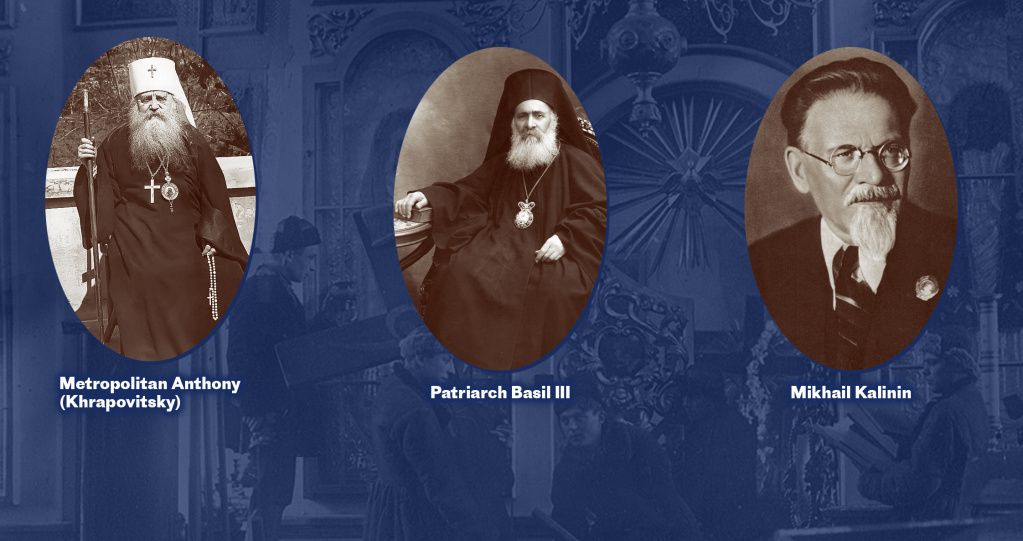
18th June 1924
His Holiness Patriarch Tikhon in his letter of reply to Patriarch Gregorios VII rejected completely this unfounded counsel:
“We have in no little way been aggrieved and surprised that … the head of the Church of Constantinople, without any preliminary agreement with us, as the legitimate representative and head of all the Russian Orthodox Church, is intervening in the internal life and affairs of the autocephalous Russian Church. The holy Councils (see the 2nd and 3rd Canons of the Second Ecumenical Council) recognize the bishop of Constantinople as enjoying only the primacy of honour but have never recognized and do not recognize a primacy of authority or primacy in general… Therefore, all missives from a commission not agreed with me as the sole legitimate Primate of the Russian Orthodox Church without my knowledge are unlawful, will not be accepted by the Russian Orthodox people and bring not peace but yet more discord and division into the life of the already much-suffering Russian Orthodox Church… The people do not support the schismatics but are with their lawful Orthodox Patriarch. Allow me to cast doubt upon the means which Your Holiness proposes to bring peace to the Church, that is to say, my removal from administering the Church and the temporary abolition of my Patriarchal rule in Russia. This will not bring peace to the Holy Church but will generate new discord and bring new tribulations to our already long-suffering faithful archpastors and pastors…”
After this letter Patriarch Gregorios in effect broke off communion with His Holiness Patriarch Tikhon and subsequently corresponded only with the Renovationist synod.
On behalf of all the Proletariat of Constantinople
21st July 1924
The representative of the Patriarch of Constantinople in the USSR archimandrite Basil (Dimopoulo) appealed on behalf of Patriarch Gregorios VII and ‘all the proletariat of Constantinople’ to the head of the Secretariat on cultic affairs under the Presidium of the Soviet Government P. G. Smidovich: “Having defeated all enemies and overcome all obstacles and having become strengthened, Soviet Russia can now respond to the requests of the proletariat of the Middle East which is well-disposed towards Russia and which in its turn disposes people towards it. It is in your hands, comrade Smidovich, to make the name of Soviet Russia even more popular in the East than it was previously, and I ardently request that you render to the Patriarchate of Constantinople this great service, as a powerful and strong government of a mighty country, even more so as the Ecumenical Patriarch, recognized throughout the East as the head of all the Orthodox people, has demonstrated his loyalty through his actions to the Soviet authorities which he has recognized”.
The grey cardinal of Constantinople
27th September 1927
The Patriarch of Constantinople Basil III sent to the chairman of the Soviet government Mikhail Kalinin a letter in which he confirmed archimandrite Basil (Dimopoulo) as his representative and “expressed his heartfelt gratitude” for the favourable disposition towards him. In the meantime, Basil (Dimopoulo), so the Renovationist press asserted, ‘reconsecrated’ the ‘Tikhonite’ churches for the Renovationists and supported Eucharistic communion only with them.
9th – 12th February 1929
The representative of the Patriarchate of Constantinople in the USSR archimandrite Basil (Dimopoulo) celebrated solemn divine services in the Renovationist churches of Leningrad, calling upon all the faithful to unite around the Renovationist Holy Synod in relation to preparations for the future Ecumenical Council.

